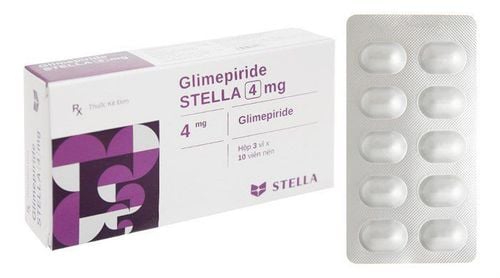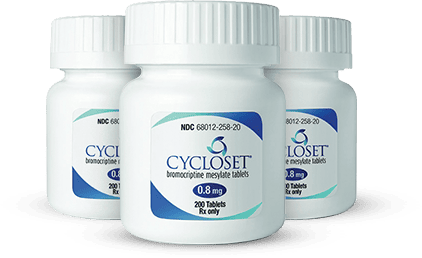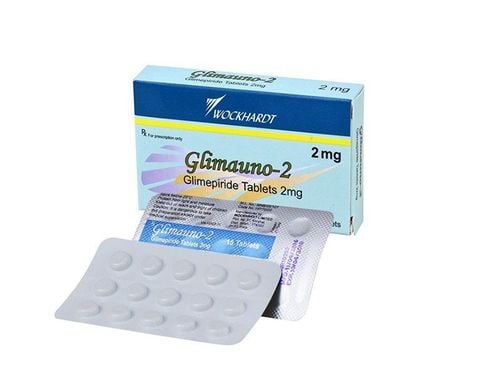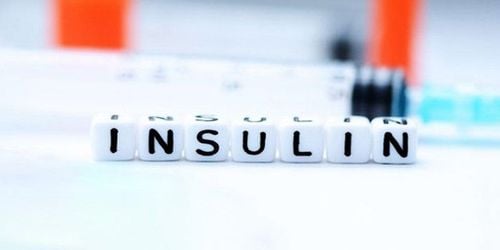This is an automatically translated article.
Glimegim 2 is a prescription drug that belongs to the group of hormone-hormonal drugs. Glimepiride is used to treat non-insulin dependent diabetes (type 2 diabetes). This is a brand-name drug, so in the process of using it, you need to be careful, use it according to the instructions of your doctor to avoid encountering unwanted side effects or interactions.
1. What is Glimegim 2?
Glimegim 2 drug is a medicine, with the main ingredient containing Glimepiride, it should be indicated in the treatment of non-insulin dependent diabetes in adults. When the patient has followed the diet, weight loss and exercise regime but the blood sugar index is still not controlled, then using Glimegim 2 is an effective solution. The main ingredient of the drug is Glimepiride 2mg. Excipients: Pham mau indigo carmine lake, Sodium lauryl sulfate, Magnesium stearate, Povidone K30, Lactose, Low-substituted hydroxypropyl cellulose (L-HPC), Sodium starch glycolate, Pham mau tartrazine dye... just enough 1 tablet
2. Uses and indications for use of Glimegim 2
Glimegim 2 is a prescription drug with the main ingredient Glimepiride. Glimepiride, a sulphonamide, belongs to the sulfonylurea group, which stimulates the release of insulin from the beta cells of the pancreas, thereby helping to lower blood glucose. In particular, Glimepiride also has extra-pancreatic effects. Glimepiride improves the sensitivity of peripheral tissues to insulin and improves the liver's ability to absorb insulin. At the same time, Glimepiride very rapidly increases the number of substances that transport and metabolize glucose across the membranes of fat and muscle cells, to increase glucose uptake into adipose and muscle tissues.
Glimegim 2 is indicated for use in adults with type 2 diabetes, also known as non-insulin dependent diabetes.
3. Usage and dosage of Glimegim 2
3.1.How to use The drug in the form of long-shaped tablets is recommended to be taken directly with plenty of filtered water, should not be crushed, chewed or mixed with water to drink, because it may change the drug's pharmacokinetics. To help the drug promote its effects as well as the body's ability to absorb the drug best, patients should take it after breakfast or lunch, and limit drinking in the evening. It is necessary to take the drug according to the prescription, not to stop using it without any indication, because it affects the treatment results as well as the prevention of side effects. Dosage: Glimegim 2 oral drug is sold and used by prescription, so patients need to follow the instructions in the prescription. Usually, depending on the severity and age of each person, the doctor will prescribe the most appropriate dose. In addition, patients can also immediately refer to the indicated dosage below:
Adults: 1 - 2 mg/day x 1 time/day (the initial dose for the case that has not been treated before). People at risk of hypoglycemia, debilitated patients, severe malnutrition, elderly people, sick people, people with kidney failure, liver failure: 1 mg/day x 1 time/day People with diabetes who have been treated Diabetes with other drugs: 1-2 mg/day x 1 time/day, not more than 2 mg/day. Maintenance dose: 1 - 4 mg/day.
For patients treated with glimepiride: 1mg/day, or after 1-2 weeks of treatment but blood glucose levels do not reach the desired level can be increased to 2mg/day. After increasing the dose, if the tolerability and response are still not effective, the dose can be increased gradually by 2 mg.
Note that the time to increase the dose is gradually 1 -2 weeks apart and only 2mg each time. The maximum daily dose should not exceed 8mg/time/day.
According to recommendations, the drug is only taken once a day.
4. Contraindications to the use of Glimegim 2
Besides the above, Glimegim 2 is contraindicated for the following cases:
Insulin-dependent type 1 diabetes. Diabetes causes the body to become acidic - ketones cause a state of pre-coma or coma. People with severe kidney failure, severe liver failure. Hypersensitivity to any component of the drug such as: glimepiride or sulfonamide Pregnant or breastfeeding mothers. Children under 18.
5. What are the side effects of Glimegim 2?
According to the manufacturer's report, in the process of using Glimegim 2 to treat type 2 diabetes, patients may experience some side effects, namely:
Common:
Nervous: Dizziness, headache, dizziness, dizziness. Gastrointestinal: Abdominal pain, nausea, discomfort, epigastric pain, diarrhea, bloating, heartburn, belching, vomiting. Eyes: Temporary visual disturbance. Uncommon
Skin: allergic or pseudo-allergic, erythema, urticaria, red pruritus, pruritus blistering. Rare:
Liver: Increased liver enzymes, abnormal yellow skin, markedly impaired liver function. Blood: Mild or severe moderate decrease in platelet count, red blood cell count, white blood cell count also decreased, agranulocytosis. Vessels: Blood vessels become inflamed due to allergies. Skin: Sensitive to UV rays and light. The above are some possible side effects, depending on the body and the ability to absorb the drug, side effects are different for each person, but there are also people who do not experience any side effects. Usually the side effects will go away after a few days, but users should not be subjective. Therefore, in the process of taking medicine for treatment, patients need to actively monitor their health as well as pay attention to abnormal symptoms like above.
6. Glimegim 2 drug interactions and other drugs and foods
Because Glimegim 2 is a brand name drug that contains many different pharmaceutical ingredients, so the drug may interact with some drugs such as:
Insulin, coumarin derivatives, oral diuretics, miconazole, chloramphenicol, phenylbutazone, MAOIs, potentiate the hypoglycemic effect of glimepiride. Glucagons, acetazolamide, barbiturates, phenytoin, reduce the effectiveness of glimepiride. Antihistamines H2, reserpine, clonidine, alcohol: change the properties of glimepiride. Coumarin anticoagulants: changing drug action. The best way to avoid drug interactions is to provide the full name of the drugs or supplements you are using or want to use to your doctor for guidance and the best solution. Absolutely do not arbitrarily use Glimegim 2 with other drugs that are not indicated.
7. Note when using Glimegim 2 to treat disease
The drug is not indicated for people under 18 years of age or people with a history of allergies to drug ingredients.
Regularly monitor the indicators when starting to use, because in some cases, sudden hypoglycemia may occur, especially in people with hormonal disorders, the elderly, people with illness and malnutrition. nutrition, liver and kidney failure, increased exercise, reduced calorie intake or frequent alcohol use.
To control blood sugar stably, the patient must take the medicine on schedule, and combine it with a scientific diet and appropriate exercise.
Because the drug can cause some side effects such as drowsiness, abdominal pain, dizziness, itching, etc. Therefore, caution should be exercised in cases including driving, working, operating or exercise,...
Do not prescribe this medicine for pregnant or nursing mothers.
Like other diabetes medications, Glimegim 2 oral medication can control blood sugar well initially. However, after a while, this effect may be reduced or no longer due to drug resistance or the body's tolerance to the drug. Therefore, only use the drug at the right dose, do not abuse it or stop it suddenly without a prescription from the treating doctor.
8. The fastest way to handle in case of overdose and missed dose
Overdose: If using high doses of Glimegim 2 can cause blood sugar to drop too quickly and can be life-threatening. Manifestations of overdose are similar to side effects such as headache, fatigue, tremors, sweating, tachycardia, restlessness, increased blood pressure, nausea, sensory disturbances, dizziness, sadness sleep, mild paralysis, loss of concentration, extreme hunger, visual disturbances, coma or stroke. However, these symptoms usually do not appear immediately, but after 12-24 hours, they appear.
Treatment:
Mild hypoglycemia: Give glucose supplements or drink 20-30g sugar water and monitor blood glucose. After 15 minutes, continue to add sugar until the blood glucose level returns to normal. Severe hypoglycemia and accompanied by signs of convulsions, coma, loss of consciousness: Immediately go to the nearest medical center for emergency and treatment. Overdose: The doctor will prescribe gastric lavage, intestinal lavage or activated charcoal to dissolve. Missed dose: Take the missed dose as soon as you remember, but if it's almost time for the next dose, skip the missed dose and take the next dose as directed in the prescription. Do not arbitrarily take supplements by overlapping doses.
In summary, Glimegim 2 is a prescription drug belonging to the group of hormone-hormone drugs, with the main active ingredient being Glimepiride, which is effective in the treatment of non-insulin dependent diabetes (type 2 diabetes). This is a brand-name drug, so you need to be careful while using it, follow the doctor's instructions to avoid unwanted side effects or interactions.
Follow Vinmec International General Hospital website to get more health, nutrition and beauty information to protect the health of yourself and your loved ones in your family.
Please dial HOTLINE for more information or register for an appointment HERE. Download MyVinmec app to make appointments faster and to manage your bookings easily.













